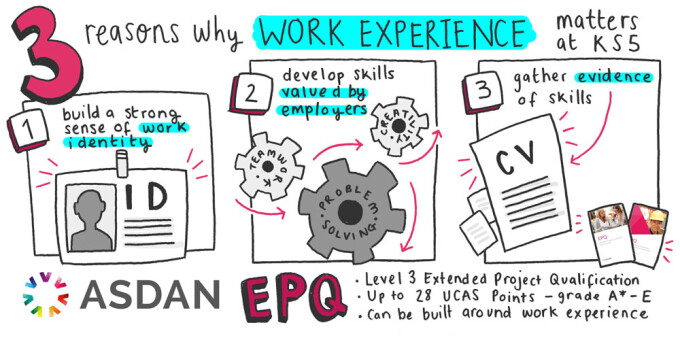Work experience is embedded into the 16-19 study programmes guidance for all learners. However Ofsted (2014) found that it is “underdeveloped” in many providers. A more challenging curriculum for post-16 students means it is harder than ever for schools and colleges to free up time to plan and undertake high quality work experience. For those who persevere, however, the benefits are considerable, both for the employers who offer the placements and for the students and their school or college.
Below are three reasons why every student should undertake a high quality work experience in Key Stage 5.
1. Build a strong work identity
A person’s work identity is not just an ambition to do a job such as a beauty therapist or digital marketing executive, it’s a person’s positive sense of self in relation to work. Developing a strong work identity is a key developmental task in adolescence, crucial for making a successful transition to adulthood. Studies show that young people with well-developed work identities have better mental health by their late teenage years than those who are unsure about where they fit into the world of work.
Stacey Dooley, TV presenter and documentary filmmaker, describes how her work identity was developed by her early experiences of work:
"Trying different jobs is a great way to get to know yourself and understand what makes you tick. When I took part in my first TV programme, I didn't know if I was fully aware that I was inquisitive and had natural empathy – someone else helped me see it.
"The tasks you do in a job and how you feel about them, but also the people you work with and what they have to say about you, can give you the most interesting insight into your own personality."
These comments resonate with my experience; my school work experience placement was instrumental in helping me decide who I am and therefore what choices I should make.
2. Develop skills that are valued by employers
Learners are growing up in an age of flexible labour markets where they are likely to change jobs and occupations throughout their working lives. Not only will they need technological expertise but also the flexibility and resilience to adapt to changes that we cannot yet foresee.
The Future of Jobs report, published by the World Economic Forum last year, considers how businesses are responding to the accelerating pace of change and innovation. In the UK, the most common strategy for managing skills shortages is to hire new staff who have the skills to work with new technologies. This puts pressure on the education system to equip learners for the future. Academic work alone cannot achieve this; work experience plays a key part in developing skills and work readiness among young people.
3. Opportunity to gather evidence of skills
Students need their CV to stand out from the crowd. According to the Gatsby Benchmark Toolkit: practical information and guidance for colleges, published by The Careers and Enterprise Company, “…universities and employers are looking for clear evidence that a student has gained a skill that they claim to have and applied it in a work-related context…” By undertaking work experience, students can demonstrate their skills such as problem-solving and analysis in the real world of work as well as developing interpersonal and communication skills.
New EPQ enhances value of work experience
ASDAN’s Extended Project Qualification Level 3, available in England, is a flexible programme that at its core has a project that students design, research and deliver. This may be something that builds on other subjects that students study and can be conducted fully in school or college.
Importantly, it is also possible to build ASDAN’s EPQ project around a student’s work experience. This gives the unique benefit of getting more value from their work experience and will enable learners to demonstrate to future employers that they have gained real-world experience.
Equivalent to half an A-level and attracting up to 28 UCAS points, the EPQ includes all the teaching and learning resources for a 30-hour taught element to support learners in designing and undertaking their project.
More information
For more information on the EPQ, please email us or call to speak to one of our advisers.
